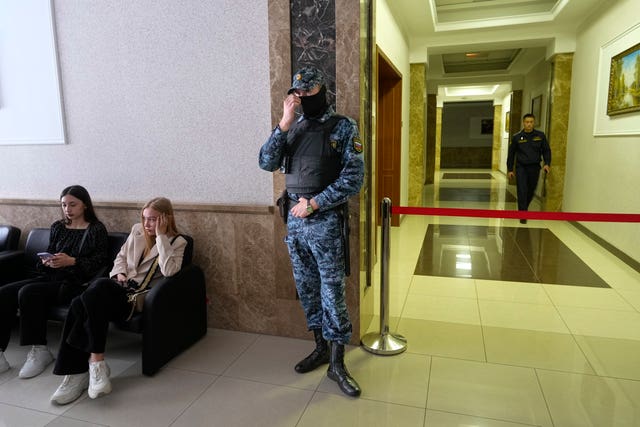Closing arguments in Evan Gershkovich espionage trial on Friday, says court
The Wall Street Journal reporter was arrested on March 29 2023 while he was on a reporting trip in Russia.

Closing arguments in the espionage trial of US journalist Evan Gershkovich will be held on Friday, a Russian court has said.
The Wall Street Journal reporter – who faces charges that he, his employer and the US government deny – attended a trial session for a second day behind closed doors on Thursday, the court said.
Unlike previous sessions in which reporters were allowed to see Gershkovich briefly before the proceedings began, there was no access to the courtroom and he was not seen, with no explanation given. Espionage cases are typically shrouded in secrecy.

Gershkovich, 32, was arrested on March 29 2023, while he was on a reporting trip.
Authorities claimed, without offering any evidence, that he was gathering secret information for the US.
The American-born son of immigrants from the USSR, Gershkovich is the first western journalist arrested on espionage charges in post-Soviet Russia.
The US State Department has declared him “wrongfully detained”, thereby committing the government to assertively seek his release.
Gershkovich faces up to 20 years in prison if found guilty, which is almost a certainty. Russian courts convict more than 99% of defendants, and prosecutors can appeal sentences that they regard as too lenient. They can also appeal acquittals.
Russian foreign minister Sergey Lavrov said on Wednesday at the United Nations that Moscow and Washington’s intelligence services were discussing an exchange involving Gershkovich, according to Russian state news agency Tass.
Russia has previously signalled the possibility of a swap, but it says a verdict would have to come first.
Gershkovich’s trial began on June 26 in the Ural Mountains city of Yekaterinburg after he spent about 15 months in Moscow’s notorious Lefortovo Prison.

The Russian prosecutor general’s office said last month that the journalist was accused of “gathering secret information” on orders from the CIA about Uralvagonzavod, a plant about 90 miles (150km) north of Yekaterinburg that produces and repairs tanks and other military equipment.
Gershkovich’s employer and US officials have dismissed those charges as fabricated and denounced the trial as illegitimate and a sham.
“Evan has never been employed by the United States government. Evan is not a spy. Journalism is not a crime. And Evan should never have been detained in the first place,” White House national security spokesperson John Kirby said last month.
In addition, Russia’s interpretation of what constitutes high crimes such as espionage and treason is broad, with authorities often going after people who share publicly available information with foreigners and accusing them of divulging state secrets.





